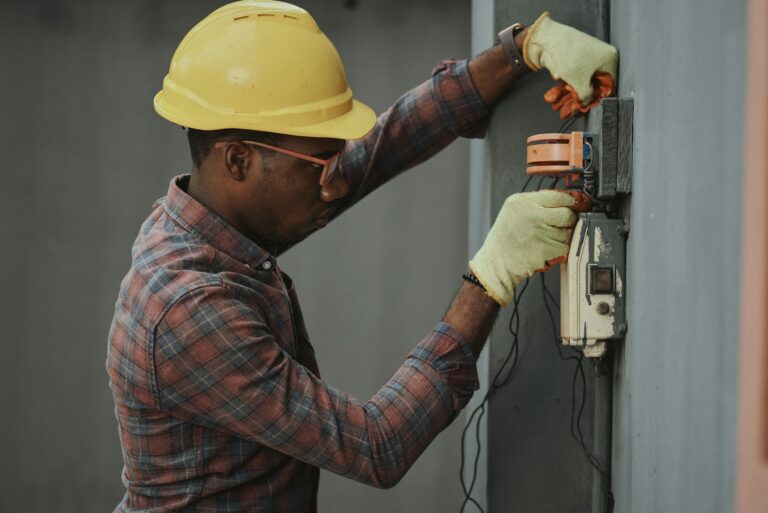Electricity powers nearly every aspect of modern living, but it also poses serious risks when mishandled. Homeowners should be proactive about understanding how to maintain a safe electrical system—from avoiding overloaded outlets to regularly checking for frayed wires or malfunctioning switches. Proper grounding, safe use of extension cords, and routine inspections can significantly reduce the chances of electrical fires or shocks.
Lighting systems, in particular, deserve attention since improper installation or outdated fixtures can increase hazards over time. Seeking guidance from professionals who specialize in lighting services Hicksville NY can help ensure that electrical setups are both efficient and up to code. Taking preventive steps not only safeguards your home but also helps maintain a reliable and energy-efficient electrical environment for years to come.
Conduct Regular Electrical Inspections
Periodic electrical inspections are crucial for home safety, as issues such as flickering lights and discolored outlets can signal serious faults. The U.S. Fire Administration notes that electrical malfunctions contribute to over 6% of residential fires. Annual or biannual inspections are recommended, particularly in older homes, to uncover outdated wiring or overloaded circuits. DIY checks can include inspecting outlets for warmth or scorch marks. Always consult a certified electrician when unsure.
Ensure Proper Grounding and Circuit Protection
Modern homes should have grounding systems to safely direct excess electricity into the ground, thereby minimizing the risk of shock or fire hazards. It is crucial to ensure the proper grounding of wiring and use Ground Fault Circuit Interrupters (GFCIs) in areas with high moisture content, such as kitchens and bathrooms, as mandated by the National Electrical Code. Regularly test GFCI outlets to verify their functionality, and consult a licensed professional for upgrades in homes that lack GFCIs or have ungrounded outlets.
Avoid Overloading Circuits
Connecting multiple devices to a single outlet or extension cord can lead to overheating and pose a fire hazard. Distribute appliances among different outlets and use surge protectors equipped with circuit breakers to prevent electrical surges from damaging your equipment. Avoid daisy-chaining cords or strips, since this increases the risk of overload. The ESFI advises that heavy-duty appliances, such as microwaves and heaters, be plugged directly into the wall socket rather than an extension cord. If your circuit breakers frequently trip, consider upgrading your electrical panel.
Maintain Electrical Appliances
Poorly maintained or damaged electrical appliances can pose a fire hazard. Regularly check cords for fraying or cracks and replace worn ones. According to the U.S. Consumer Product Safety Commission, small appliances like coffee makers, toasters, and hairdryers cause thousands of house fires annually. Unplug appliances when not in use, especially portable ones or those used in damp areas. Follow the manufacturer’s maintenance instructions and avoid using recalled or outdated products. Proper care enhances home safety and extends the lifespan of your devices.
Implement Childproofing Measures
Implementing childproofing measures is crucial for families with young children to prevent hazards associated with electrical outlets and cords. Recommended actions include installing tamper-resistant outlet covers in accessible areas, tidying loose cords to prevent tripping hazards, and educating children about the dangers of inserting objects into outlets or using electrical devices unsupervised. Establishing household rules, such as keeping devices away from water sources, is also crucial as children grow older.
Practice Outdoor Electrical Safety
Electrical safety outside is crucial. GFCIs and weather-resistant covers are required for all exterior outlets. Use outdoor-rated power equipment, lighting, and extension cords, and keep them dry to prevent damage. Never utilize electrical gadgets in moist conditions or with wet hands. To prevent shocks or fires, regularly inspect exterior fixtures for wear and damage and replace them as needed.
Prepare for Electrical Emergencies
It’s critical to act swiftly and securely in an electrical emergency. Ensure that everyone is aware of the location of the main circuit breaker, so they can turn off the power if necessary. Keep a Class C fire extinguisher nearby and instruct family members on its proper use. Electrical fires should never be extinguished with water; instead, turn off the power source and use a fire extinguisher. Evacuate immediately and contact emergency services if the situation is hazardous.
Know When to Call a Professional
Specific electrical issues, such as breaker trips, sparking outlets, unusual odors, or wiring problems, require the expertise of a professional electrician. Licensed electricians are equipped to resolve complex issues and ensure safety standards are met. Do not delay—urgent concerns demand immediate inspection. Adhering to safety protocols helps protect your household. Regular inspections and prompt responses are crucial for maintaining a safe and reliable electrical system.
Building a Safer Electrical Future
Electrical safety at home begins with awareness and consistent preventive actions. Conducting regular inspections, using appliances correctly, maintaining equipment, and following safety codes are key to preventing accidents. It’s also important to know when to hire a professional. Respecting electrical safety ensures the property remains safe and safeguards everyone inside.

